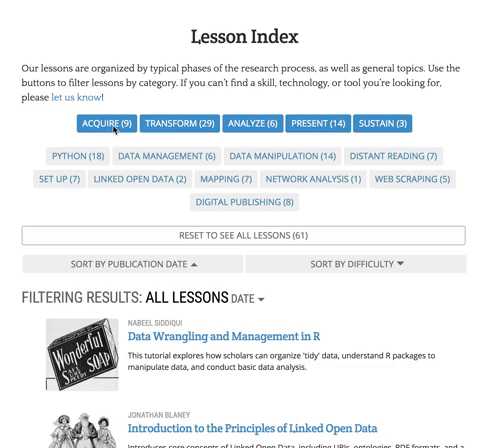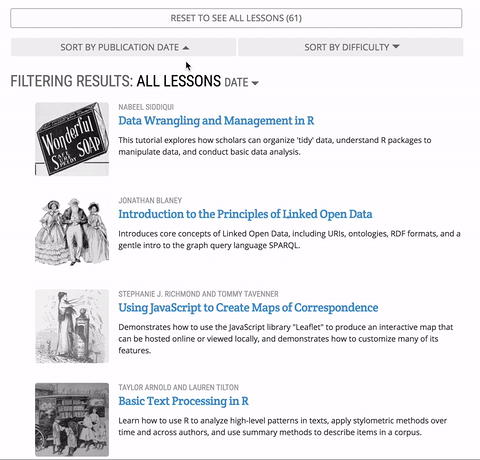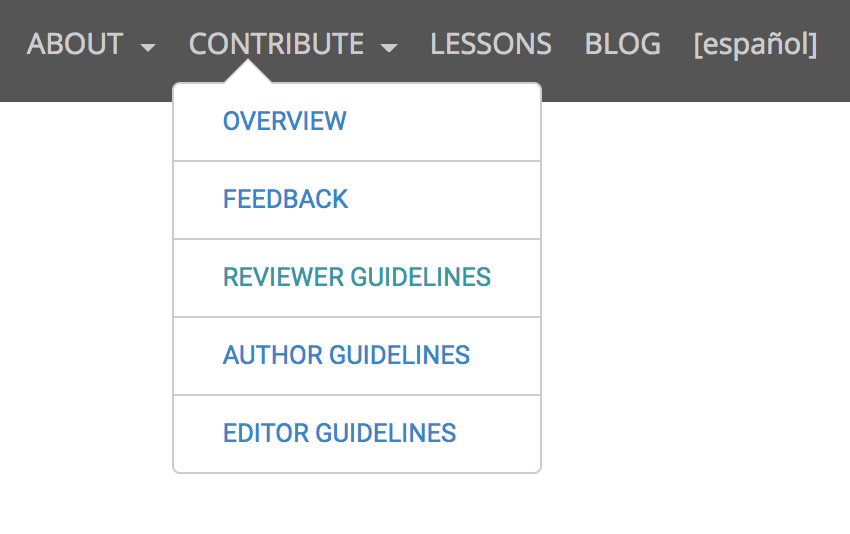It’s been a busy year so far at the Programming Historian, and even reaching back into 2016, we’ve been editing and publishing more lessons than ever thanks to the great enthusiasm and energy of our authors and reviewers. Our original lessons index page that’s served us well for many years rapidly grew longer, denser, and considerably harder to use.
That’s why we’re excited to launch our new lessons page to make it easier to browse our continually growing set of lessons. As always, but especially after this last round of updates, we’re hoping you’ll share your thoughts about the usability of the Programming Historian, particularly any suggestions (however major or minor) to make our site easier to use.
A brief description of our new lessons page functionality: we have tagged each of our lessons with one of the five typical phases of a research process involving data: acquire, transform, analyze, present, and sustain. We’ve also tagged each lesson by topic and/or technology. Both of these sets of tags are now clearly displayed on the lessons page by two distinct sets of buttons; a single click immediately filters the visible list of lessons.

Buttons for filtering lessons by phases and topics
You can also sort lessons by difficulty and publication date. If you want a complete list of all lessons, just hit the reset button. By default, we list lessons in reverse chronological order so that when you visit from time to time, you’ll always see what’s new at the top of the page (also using any filter you want to apply). Of course we hope all this is totally obvious once it’s in front of you. Our super-fast on-the-fly sorting is powered by list.js, which was a breeze to implement thanks to the skill and ingenuity of our editor Amanda Visconti. As you filter and sort, you’ll notice that the URL updates, too, so that you can bookmark or share any particular set of lessons.

Sort lessons by publication date or difficulty
Making it easier to view lessons by categories and topics means that it’s also easier to discover if we don’t have a lesson on something you’re interested in. In that case, we hope you’ll let us know what you’re looking for. Maybe you’ll even consider working with us to write a lesson!
You might also notice that we’ve refreshed our design a little (and finally have a proper homepage!) to make our pages and lessons a bit easier to find and read. In that vein, we’ve streamlined our navigation links at the top of our site to bring more visibility to our author, reviewer, and editor guidelines pages.

Find author, reviewer, and editor guidelines quickly
While we’re convinced that PH is now easier than ever to use, there’s always room for improvement and inevitably we’ve overlooked a few things. If you can’t find what you’re looking for, or something looks wrong, we’d be eternally grateful for suggestions.
As always, we’re tremendously proud of all the people who have made the Programming Historian a huge success and a model volunteer, community-driven resource. We hope you’ll consider contributing in some way, however large or small. And don’t hesitate to shout out to @ProgHist!
About the author
Fred Gibbs is an assistant professor of history at the University of
New Mexico.